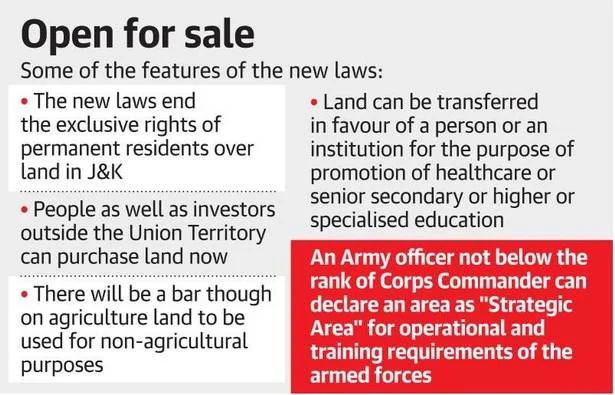Amendment Related to Land in Jammu and Kashmir | 29 Oct 2020
Why in News
Recently, the Centre notified ‘Union Territory of Jammu and Kashmir Reorganisation (Adaptation of Central Laws) Third Order, 2020', which states that any Indian citizen can now buy land in Jammu and Kashmir (J&K) without being a domicile.
Key Points
- The introduction of the UT of J&K Reorganisation (Adaptation of Central Laws) Third Order, 2020 has resulted in the repeal of at least 11 land laws in J&K, including the J&K Big Landed Estates Abolition Act that had resulted in famous ‘Land to tiller’ rights.
- Features of Latest Order:
- No domicile or permanent resident certificate is required to purchase non-agricultural land in the UT.
- People as well as investors outside J&K can now purchase land in the UT, ending the exclusive rights of locals over the land granted under Article 370 (now abrogated).
- The Centre has been arguing that Article 370 hampered development in the U.T. as investors were unable to purchase land prior to 5th August 2019.
- Amended the Jammu & Kashmir Land Revenue Act, 1996, under which only agriculturists of J&K can purchase agricultural land.
- However, it doesn't bar the agricultural land to be used for non-agricultural purposes. A District Collector can allow the agricultural land to be used for non-agricultural purposes.
- The Centre also notified the Real Estate (Regulation and Development) Act, 2016, which paves the way for the acquisition of land in J&K by all Indian citizens.
- Previously, Article 35-A of J&K Constitution placed prohibitions on the sale of land to those who were not state subjects.
- Abolished the Big Land Estate Abolition Act, 1950 – this provided for redistribution of land which paved the way for rural prosperity and ended landlordism in J&K.
- Empowers the Centre to declare any area in J&K as ‘strategic’ and intended for the direct operational and training requirement of the armed forces.
- However, this can be only done by an army officer of or above the rank of a corps commander.
- Spouses of a J&K domicile shall also be deemed as a domicile.
- Earlier, spouses of domiciles were not considered domiciles.
- Children of central government officials posted for over ten years in J&K will also continue to be considered domiciles.
- No domicile or permanent resident certificate is required to purchase non-agricultural land in the UT.
- Issues Involved:
- For more than two years now, J&K has been without an elected government. All the changes being introduced in the UT have been steamrolled by the Centre rather than being legislated by elected representatives of the people.
- This has created suspicions in the J&K that the Centre is gradually disempowering the local population and consolidating control through executive power.
Land Reforms in Kashmir
- The Kashmir Valley had a history of cruel exploitation of tillers through the periods of Afghan, Sikh and Dogra rule.
- The Sheikh Abdullah’s government brought the Big Landed Estates Abolition Act, in 1950, through a slogan land to the tiller.
- The Act placed a ceiling on land ownership at 186 kanals (about 22 acres).
- The rest of the land of a landlord was redistributed among share-croppers and landless labourers, without any compensation to the landlord.
- This led to most radical land reform anywhere in the world outside the Communist bloc. It brought a social transformation that has few parallels. It ended landlordism in J&K and paved the way for rural prosperity.
- This land reform was so popular in Kashmir that it continued to be pushed for the next quarter-century. The ceiling was gradually decreased until the last of the reform Acts in 1975.

